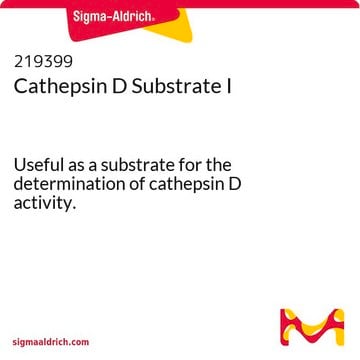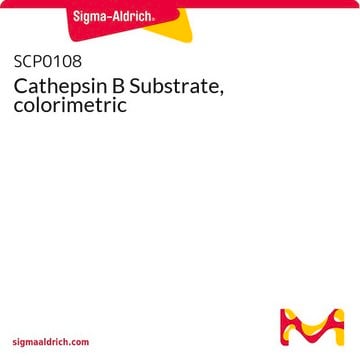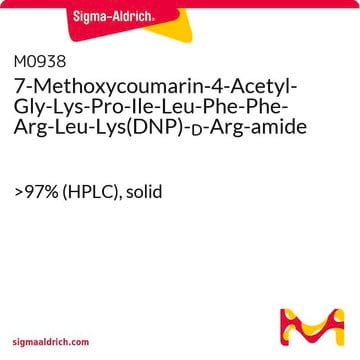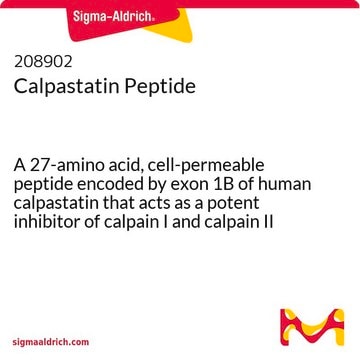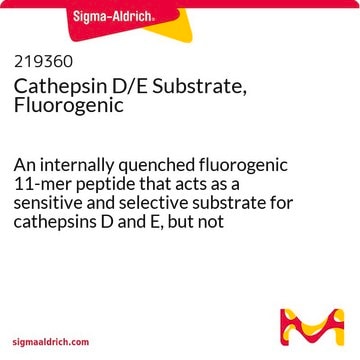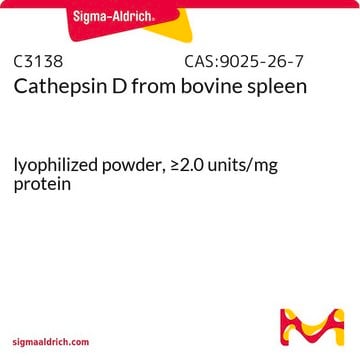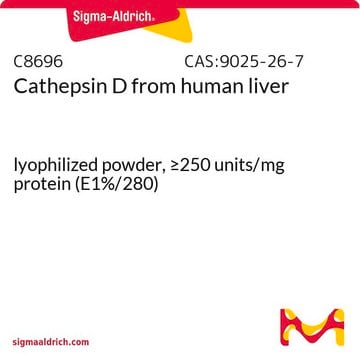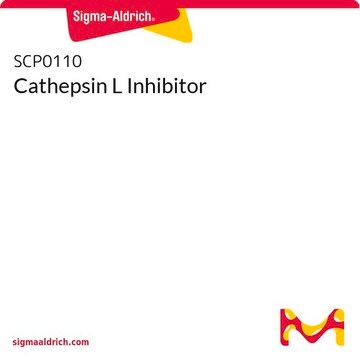SCP0109
Cathepsin D Substrate
≥95% (HPLC), lyophilized
Sign Into View Organizational & Contract Pricing
All Photos(1)
About This Item
Empirical Formula (Hill Notation):
C49H55N9O7
Molecular Weight:
882.02
UNSPSC Code:
12352202
NACRES:
NA.32
Recommended Products
product name
Cathepsin D Substrate,
Assay
≥95% (HPLC)
form
lyophilized
composition
Peptide Content, ≥85%
storage condition
protect from light
storage temp.
−20°C
Amino Acid Sequence
Bz-Arg-Gly-Phe-Phe-Pro-4M2NA
General description
Cathepsin D Substrate is a peptide with Bz-Arg-Gly-Phe-Phe-Pro-4M2NA sequence.
Application
Cathepsin D Substrate has been used in cathepsin D enzymatic assays with Dictyostelium, midgut samples of beetles Stromatium fulvum (Villers) and of P. versicolora.
Storage Class Code
11 - Combustible Solids
WGK
WGK 3
Flash Point(F)
Not applicable
Flash Point(C)
Not applicable
Certificates of Analysis (COA)
Search for Certificates of Analysis (COA) by entering the products Lot/Batch Number. Lot and Batch Numbers can be found on a product’s label following the words ‘Lot’ or ‘Batch’.
Already Own This Product?
Find documentation for the products that you have recently purchased in the Document Library.
Customers Also Viewed
Digestive proteolytic profile in Stromatium fulvum Villers (Coleoptera: Cerambycidae)
ZIBAEE A, et al.
Romanian Journal of Biochemistry, 51, 17-30 (2014)
Robert J Huber et al.
Cellular signalling, 58, 79-90 (2019-02-17)
Mutations in CLN3 cause a juvenile form of neuronal ceroid lipofuscinosis (NCL). This devastating neurological disorder, commonly known as Batten disease, is currently untreatable due to a lack of understanding of the physiological role of the protein. Recently, work in
Proteolytic activity in Plagiodera versicolora Laicharting (Coleoptera: Chrysomelidae): Characterization of digestive proteases and effect of host plants
Zibaee A and Hajizadeh J
Journal of Asia-Pacific Entomology, 16, 329-334 (2013)
Hong-Ye Wan et al.
Advanced science (Weinheim, Baden-Wurttemberg, Germany), 5(3), 1700585-1700585 (2018-03-30)
Targeting protein degradation is recognized as a valid approach to cancer therapy. The ubiquitin-proteasome system (UPS) and the autophagy-lysosome pathway are two major pathways for intracellular protein degradation. Proteasome inhibitors such as bortezomib are clinically approved for treating malignancies, but
Tonyia Eaves-Pyles et al.
PloS one, 6(9), e24869-e24869 (2011-09-29)
Bacteria release flagellin that elicits innate responses via Toll-like receptor 5 (TLR5). Here, we investigated the fate of apically administrated full length flagellin from virulent and avirulent bacteria, along with truncated recombinant flagellin proteins in intestinal epithelial cells and cellular
Our team of scientists has experience in all areas of research including Life Science, Material Science, Chemical Synthesis, Chromatography, Analytical and many others.
Contact Technical Service